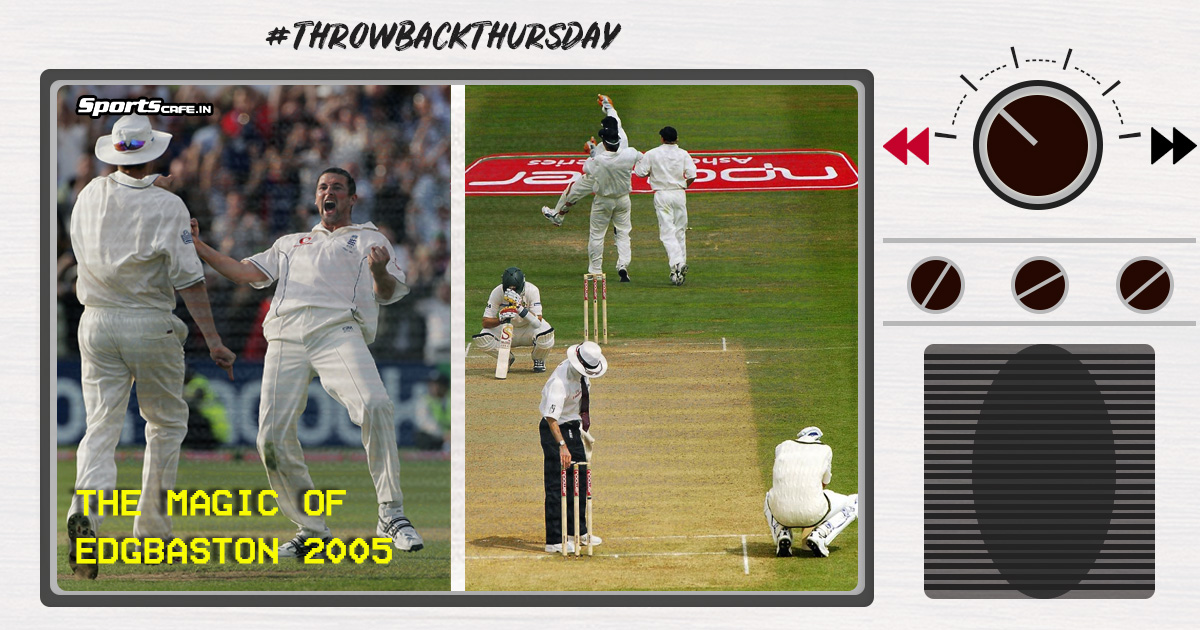Throwback Thursday | Steve Harmison’s stunning short ball puts England back in 2005 Ashes reckoning

Steve Harmison’s stunning short ball puts England back in 2005 Ashes reckoning
|SportsCafe
Welcome to a series, where after we see the nearly twisted future through What if’s, we look back in the cricketing times at a particular game which shaped the game, the rivalry and everything attached with it. This week, we are looking at England and Harmison's heroics in the 2005 Ashes.
The sun was shining bright in Birmingham, in England’s West Midlands region miles away from Lord’s, where Australia completed a stupendous victory away from home against England. The scene was set, with Stephen James Harmison running hard to bowl his eighteenth over of the innings, with Australian tail still wagging a strange battle. While Brett Lee was batting on 42, his partner at the other end, Michael Kasprowicz was staying poignant on 20, facing 29 deliveries. The Barmy Army were there, cheering for the home side, as they were just one wicket away from making a stunning return to level the series. It could be anyone’s game, as the lanky pacer runs into bowl with Brett Lee facing the threat, and only three runs separated the two sides. But, hold on, before we get to the moment, let us look at what transpired this moment in history.
Coming into the series, both sets of media had hyped the five-match fixture so much that it garnered the eye-balls from across the globe. Just before setting foot on the English shore, Australia’s pacer Glenn McGrath had reckoned that it would be a steamroller for the Australian side, who would win the series 5-0. The comments, his attitude and the threat he posed all were well highlighted.
Before this series in 2005, the visiting Kangaroos had proved their form in both Test and ODI format, winning the 2003 World Cup in South Africa, with an identical team. In contrasting fashion, England were walking into this series, on the back of a terrible two-wicket loss against West Indies at home in the 2004 edition of the Champions Trophy, a game where they should have sealed the deal much earlier.
The media had already painted a tainted colour on the English side, which hadn’t won an Ashes series since 1986-87 led by the legendary batsman, Mike Gatting. Ever since then, in eight consecutive editions of the series, it was the Australian side, who walked away with a victory, retaining the urn Down Under. Just three years before this well-anticipated series, an England side, led by Nasser Hussain, were demolished by the hosts in an incredible fashion, with pacers - Jason Gillespie and Glenn McGrath putting on a show, picking up 39 wickets between them. In particular, the lanky Australian pacer gave it back to the English team, averaging just 20 throughout the series, with just one England pacer in the top five list for wicket-takers.
When Michael Vaughan took over the reins in 2003 series against South Africa, the aim was clear, to bring England back on the charts of being a side who were well revered and could take on opponents. Under the new skipper’s leadership, England moved up the ladder, to second place in the ICC Test Championship. Alongside Marcus Trescothick and the English skipper, the newly formed trio of Matthew Hoggard-Andrew Flintoff-Steve Harmison had already weaved a pertinent thread, which caused a huge set of expectations for the Barmy Army.
After Australia won the toss, they were massively on the back foot in the first Ashes Test, courtesy of the four-man English pace attack, getting knocked over for 190 with rekindled hopes. England had the chance, for the first time since 1986-87 to salvage some pride, gaining the Urn back to where it all started. Surely, just like their 2004 Champions Trophy hopes, this too slowly faded away when familiar foe Glenn McGrath put on a dazzling show to bowl the hosts out for 155, which eventually helped Australia to a 239-run victory.
For the English media, they absolutely tore into their side, with the MCC members putting on their hats of ‘disappointment.’ So when courtesy of a rugby ball, McGrath was ruled out of the second Test in Birmingham, the English media decided to give it back to the Australians, in their own style, with the choicest of words. Emotions deep inside for both sides were running adrenaline high but on the field, they had to part ways with their emotion. However, when Ponting won the toss and elected to bowl first, only one captain left his emotion behind, with the media’s tactics playing out as expected on the visitors.
Finally, presented with the opportunity to put runs on board, the home side caught up with the expectation wave. Leading by example, the experienced opener, Marcus Trescothick put on a show, alongside Andrew Strauss for the first wicket, taking them to 112. Furthermore, knocks from the flashy Kevin Pietersen and Andrew Flintoff eased England to a huge first-innings total of 407, with only Shane Warne amongst the wickets for the Australian side, with a four-fer. In the absence of their starman, it was clear as crystal that Australia struggled - which made the series more exciting.
In reply, the visitors too were led by their opener, Justin Langer, as they reduced the first innings total by 99 runs. In particular, the visiting tail, which wagged a lot in the first Test were sent backpacking to the hut and finally, there was an aura that this English side could win against Australia. In the second innings as well, it was the same pattern of play, with the all-rounder pulling the side out of trouble, with a 133-ball 73, which left the English fans to raise up in the hysteria.
Just 282 runs separated the two sides, Australia could very well move up the charts, with a 2-0 win and a returning Glenn McGrath bag the urn back on their flight to the Gold coast. On the other side, a determined English side knew that this opportunity was not like the other ones that they received in the past, with a statement to make. When the pace-quartet struck four times to reduce the tourists to 107/4, the Barmy Army were already celebrating in the stands, in contrasting fashion to the elite members, who were all suited with their richly look while the Barmy Army were wild in celebrations.
When Harmison delivered the emphatic slower delivery to dismiss Michael Clarke for the eighth-wicket, England kick-started off the celebrations, the fans, the commentators, everyone were sure that the result was going one way. Flintoff was off on a customary run, after he caught Warne on his backfoot, clipping the wicket, with 62 runs still separating the two sides. However, there was one more to go, slowly yet steadily, the partnership between Michael Kasprowicz and Brett Lee started growing, with every run getting an equally verbal response from the English team and the crowd.
Every boundary was met with a smirk from Michael Vaughn and hush and pushes from the close-in fielders. When 24 runs were needed, you could sense the nervousness creeping in the English camp, with Harmison straying down the line and when Simon Jones dived in spectacularly, Flintoff was left with hands on his head. It boiled down to this - three runs, with Harmison running in full-pace to bowl, with Kasprowicz on strike. It could be anyone’s game, more at stake for England and for Australia, their chance of yet again recovering miraculously from losing positions. It was a moment of all-or-nothing, and here we are.
Welcome to a moment in history
— faceplatter49 (@faceplatter49) July 2, 2020
